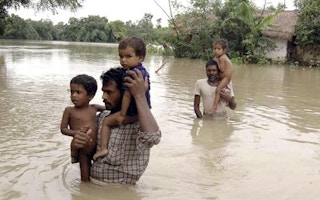Developed nations are failing the transparency test on funding meant for developing countries to cope with climate change, said the International Institute for Environment and Development (IIED) last week.
The London-based non-profit research institution published a scorecard, rating nine countries and the European Union on 19 September, ahead of the United Nations Framework on Climate Change Conventions (UNFCCC) talks this week in Panama.
Using reports from donor nations on their efforts to deliver a combined US$30 billion in aid funding for an interim global climate change fund – called ‘fast-start finance,’ - evaluators assessed the transparency of donor nations based on 25 criteria. The criteria were used to determine the adequacy of the information provided, whether or not countries were tracking and allocating climate funding appropriately, and whether or not countries provided information for individual projects.
All of them scored poorly on the evaluation, with Norway’s score of 52 per cent topping the ratings and New Zealand coming in last at 26 per cent.
The other nations assessed were Japan, which came in second at 50 per cent, the European Union - with a rating of 48 per cent, Australia at 34 per cent, Switzerland and the United States at 32 per cent, and with a rating of 30 per cent - Canada, Iceland and Liechtenstein.
In a press statement, the evaluators, which include experts from IIED, Brown University in the United States and the Center for Comparative and International Studies in Zurich, said that the low scores masked progress in some areas and showed that countries are not consistent in being transparent about all aspects of their funding.
The evaluators also urged climate negotiators to create a registry through which countries could report funds they donate in a standard format that includes project-specific information.
“Transparent reporting is essential to enable recipient countries to plan their responses to climate change and for civil society to hold governments to account on their promises,” said IIED’s senior climate change fellow, Dr Saleemul Huq.
Dr Huq added that transparency is as important for taxpayers in developed countries, where economic woes are straining budgets, as it is for climate-vulnerable countries in the South.
Developed countries committed to providing the US$30 billion fast-start financing at UNFCCC talks in 2009. The money, to be donated between 2010 and 2012, was pledged to help developing countries move towards low-carbon economies and adapt to climate change.
The bulk of the fast-start climate finance pledges are from Japan, which pledged US$15 billion; EU members pledged US$10.3 billion while the United States promised US$1.7 billion.
Progress on meeting the US$30 billion target is far from clear. NGOs have accused donor countries of using money previously pledged for other aid projects, such as programmes to help countries reach millennium development goals (MDGs), to satisfy their climate fund requirements.
Donations to the fast-start finance fund are required to be ‘new and additional’ according to the agreement reached at the 2009 talks in Copenhagen, which, although non-binding, reaffirmed developed countries’ commitment to helping developing nations cope with climate change.
Brown University’s David Ciplet, one of the evaluators, said that increasing the transparency of climate finance was crucial to building trust in the on-going UNFCCC talks.
“A transparent system for reporting on climate finance is essential to make sure that funds are adequate, predictable and used responsibly,” he noted.










